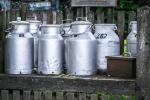
Horizon Europe AGRO4AGRI Project: Promoting the advanced use of agrochemicals for sustainable agriculture
- Type Project
- Status Signed
- Execution 2024 -2028
- Assigned Budget 5.329.362,5 €
- Scope Europeo
- Main source of financing Horizon Europe 2021-2027
- Project website Proyecto AGRO4AGRI
Agrochemicals encompass a range of chemicals, such as fertilizers, plant biostimulants, and agricultural pesticides, used to improve crop yields by providing essential nutrients and mitigate diseases and weeds in agriculture. Despite these benefits, the misuse of most common agrochemicals has serious negative consequences for human health and the environment. Therefore, new EU policies focus on avoiding or reducing their use.
The EU-funded AGRO4AGRI project seeks pioneering solutions for plant nutrition and protection that are safe for the environment and farmers. These include nano- and bio-based controlled-release fertilizers, plant biostimulants, and biopesticides based on RNAi technology. The project's goal is to improve the efficiency of agrochemicals to reduce their use by more than 50%.
AGRO4AGRI includes R&D and validation phases, with the long-term goal of minimizing the use of agrochemicals in agriculture by more than 50% to align with the "farm to fork" strategy, among other EU initiatives. It also assesses the social, economic, and security impacts, as well as activities to foster engagement with society and policymakers, in order to broaden the impact and better meet EU objectives and position Europe at the forefront of agribusiness.
Agrochemicals are chemicals used in agriculture, such as fertilizers, plant biostimulants, or pesticides. The application of fertilizers in synergistic combination with biostimulants provides the nutrients needed to improve crop yield, while pesticides are used to reduce the risk of losses due to plant diseases and weeds in agricultural production. Today, the agricultural sector faces several challenges, namely:
- Fertilizer loss and leaching: Fertilizer effectiveness must be improved by controlled delivery of nutrient ingredients to improve their availability to plants over longer periods.
- Large quantities of pesticides are used: it is necessary to reduce pesticide use, increase selectivity and prevent pest resistance.
- Bioaccumulation and bioconcentration: Accumulation in soil and groundwater and bioconcentration in flora and fauna must be avoided.
High dependence on water availability: Increasing the efficiency of water use and management is essential due to water risks. In this context, nanotechnology and biotechnology strategies have recently gained greater interest in the agricultural sector compared to conventional agricultural techniques.
AGRO4AGRI seeks to provide innovative, safe, and sustainable-by-design solutions for plant nutrition and protection, consisting of controlled-delivery nano- and biological plant fertilizers and biostimulants, and targeted biopesticides based on RNAi technology, both to improve the efficiency of agrochemical use. AGRO4AGRI involves R&D and validation stages, with the goal of minimizing the use of agrochemicals in agriculture by more than 50% over the long term, in line with the Farm to Fork Strategy, among other EU initiatives.
Other project developments include the assessment of economic, social, and security impacts, activities to promote social inclusion, and engagement with policymakers to generate broader impacts and better meet EU objectives and position Europe at the forefront of agribusiness.
- AINIA (AINIA)







